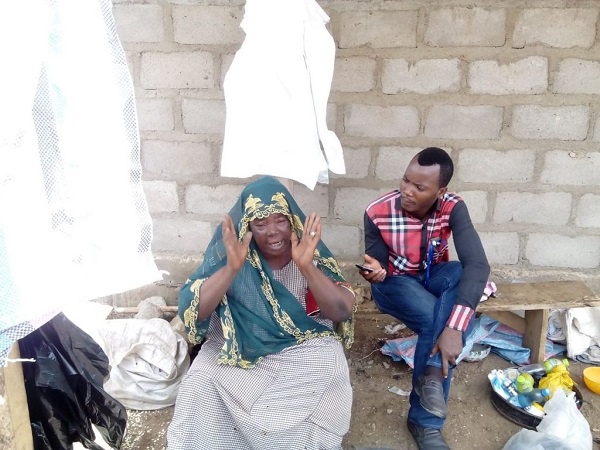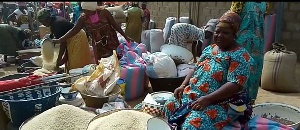A surging demand for a beer unofficially named after John Mahama, Ghana’s immediate-past president, is on the verge of disastrously throwing the cost of gari beyond the reach of the poor class in the country’s north.
Ruut Extra, a beverage with 6.0% volume of alcohol, is brewed with cassava- the same raw material used in producing gari, a common commodity supposed to be the cheapest food in West Africa- among other ingredients. But ironically, the demand that has made the cost of the starchy food sky-high is jointly being pumped by poor people who consume the same beer everywhere as much as the rich do.

A trader expresses worry over the impact of cassava scarcity on her gari business in Bolgatanga
Regular buyers in the Upper East region, who have links to large-scale producers of gari, told Starr News that wholesale purchase of cassava tubers being done by the brewers of “John Mahama” to meet overwhelming demand for the beer had triggered a scarcity of cassava for gari production, resulting in the ‘killer price’ tag on that foodstuff on the market.
“They are using the cassava for drink, for the beer- John Mahama. That is how the [cost] of gari has [risen] up. So, there is no cassava and the shortage is killing our business because the production cost is forcing us to increase the price and customers are either now buying less or buying something else,” said Veronica Atubiga, a respected gari dealer at the Bolgatanga Central Market.
Another popular gari trader, Hajia Sawudatu Moro, added her voice, saying: “It is not only the use of cassava for John Mahama beer that has made gari expensive. I get my supply of gari from Bimbilla [in the Northern Region] but the supply has not been so good because of [erratic] rainfall in the north. And another thing that has made gari costly is the high electricity consumed to mill the cassava.”
Gari more expensive than rice, maize
Checks by Starr News at some markets in the region have revealed that gari, in the wake of the said scarcity of cassava, has become ‘gold dust’ and is worth its weight in gold far more than the value at which maize, and even rice, generally are pegged.

An average bag of gari goes for Gh¢300, rice Gh¢150 and maize Gh¢120 in Bolgatanga
Whilst an average bag of gari goes for Gh¢300 at the Bolgatanga Central Market, a package of rice in the same bag size costs Gh¢150 and a bag of maize at the same market is sold for Gh¢120. At Navrongo, capital of the Kassena-Nankana Municipality, a bag of gari sells for Gh¢170, maize valued at Gh¢150 and rice is marked between Gh¢120 and Gh¢130.
“This is so alarming,” remarked Rev. Dennis Tong, the Parish Priest of the Anglican Church in Bolgatanga. “The same gari which people used to hide to eat some time ago is now even more expensive than the rice many people used to eat only once in a year because it was costly.”
Margaret Asubey Yakubu, an accountant, told Starr News whilst shopping inside the Bolgatanga Old Market: “I feel very bad- very, very bad- because gari is not any nutritious food that should be so expensive. Only two years ago, a bag of gari was Gh¢150, Gh¢180. We have foreign dogs [which] we used to feed with gari in our house. But of late we buy rice, because the rice is more economical. We used to buy gari with kenkey [for the dogs]. Every week we buy like Gh¢40. But since we bought [a bag of] rice at Gh¢150, it took us for a month and the rice was better.”
Why the beer is called John Mahama
Ruut Extra is among a number of things named after former president John Dramani Mahama in the Upper East region.
There are hundreds of a brand of motor tricycle crisscrossing the region like a tent on wheels being used to transport passengers and goods. They are smallish, easily bullied by big vehicles on the road and occasionally ridiculed by strong stray winds. Widely described as “camboo” because they are shaped like a footwear made with canvas, the vehicles are generally referred to as “Mahama Camboo” for the reason that they were introduced during Mahama’s presidency.
The highly patronised beer, some say, derived the nickname the region calls it- John Mahama- generally because it was introduced during Mahama’s term and consumers found it cheap to buy everywhere in the midst of economic hardship.
“It’s very cheap. A bottle is Gh¢3. A crate sells at a rate three times faster than the crates of other drinks sell at our drinking spot,” Christopher Agomna, an aide to a proprietor of a bar in Bolgatanga, told Starr News Sunday.
Business News of Monday, 27 February 2017
Source: starrfmonline.com













